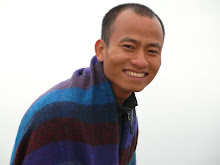January 13, 2009 | Kenneth Bacon | Tagged as: Burma
"What do they think when they see me?” asked the Venerable Kovida, a Buddhist monk from Burma. Given that he was dressed in bright saffron robes and flip-flops while hiking in the Grand Tetons in Wyoming, the question made sense.
In fact most of the hikers who passed Kovida walking in the new Laurance S. Rockefeller Preserve last week seemed quite nonchalant. Maybe they were too busy looking at their feet on the path. But for those of us from Refugees International—both staff members and board members--walking with Kovida, the hike was anything but routine.
He loved the beautiful surroundings and told us how much they reminded him of places in Burma that also had majestic mountains, rushing streams and tall trees. It was clear that he missed his country, but it’s unclear when—or if—he will get back there. Kovida received political asylum in the U.S. in March after leading demonstrations against Burma’s military junta last year.
The demonstrations took place during a time of increasing fuel prices and economic stringency in Burma, already one of the world’s poorest countries. Since Buddhist monks survive on alms they collect from the people everyday, “we wanted to give something back” to the people by demonstrating or speaking on their behalf, Kovida explained. Although the monks were leading peaceful demonstrations, the government accused them of violence and started to arrest them and their families. Kovida fled, ultimately to the U.S.
Kovida told his story repeatedly in Jackson, Wyoming, where he was visiting to help Refugees International explain its efforts to protect displaced and vulnerable people in Burma and around the world. He told a large reception at the Oswald Gallery how he had hidden for weeks, growing his hair out and turning it blond so he could escape across the border in mufti. Even though his picture had appeared on the front page of newspapers across Burma, his disguise worked, and he was able to escape into Mae Sot, Thailand, where he gave extensive interviews and met a Refugees International delegation shortly after his escape.
Today he lives in California, working and learning English. His dream is to go to college here, but he is not too busy to forget the suffering of his people in Burma.
In March Refugees International published a report entitled Burma: A New Way Forward. It highlighted the poverty in Burma and noted that the strict U.S. sanctions against Burma’s military regime are hurting efforts to help the Burmese people. A growing network of United Nations organizations, international aid agencies and Burmese civil society organizations are actually getting help to the Burmese people. That network has increased somewhat since Cyclone Nargis in early May.
Burma will not be a prosperous country until its repressive military regime is replaced by a government that cares more about the Burmese people than its own power. Hearing the Venerable Kovida talk about the deprivation of his people makes it clear that we should be doing more to help them now.
--Ken Bacon
In fact most of the hikers who passed Kovida walking in the new Laurance S. Rockefeller Preserve last week seemed quite nonchalant. Maybe they were too busy looking at their feet on the path. But for those of us from Refugees International—both staff members and board members--walking with Kovida, the hike was anything but routine.
He loved the beautiful surroundings and told us how much they reminded him of places in Burma that also had majestic mountains, rushing streams and tall trees. It was clear that he missed his country, but it’s unclear when—or if—he will get back there. Kovida received political asylum in the U.S. in March after leading demonstrations against Burma’s military junta last year.
The demonstrations took place during a time of increasing fuel prices and economic stringency in Burma, already one of the world’s poorest countries. Since Buddhist monks survive on alms they collect from the people everyday, “we wanted to give something back” to the people by demonstrating or speaking on their behalf, Kovida explained. Although the monks were leading peaceful demonstrations, the government accused them of violence and started to arrest them and their families. Kovida fled, ultimately to the U.S.
Kovida told his story repeatedly in Jackson, Wyoming, where he was visiting to help Refugees International explain its efforts to protect displaced and vulnerable people in Burma and around the world. He told a large reception at the Oswald Gallery how he had hidden for weeks, growing his hair out and turning it blond so he could escape across the border in mufti. Even though his picture had appeared on the front page of newspapers across Burma, his disguise worked, and he was able to escape into Mae Sot, Thailand, where he gave extensive interviews and met a Refugees International delegation shortly after his escape.
Today he lives in California, working and learning English. His dream is to go to college here, but he is not too busy to forget the suffering of his people in Burma.
In March Refugees International published a report entitled Burma: A New Way Forward. It highlighted the poverty in Burma and noted that the strict U.S. sanctions against Burma’s military regime are hurting efforts to help the Burmese people. A growing network of United Nations organizations, international aid agencies and Burmese civil society organizations are actually getting help to the Burmese people. That network has increased somewhat since Cyclone Nargis in early May.
Burma will not be a prosperous country until its repressive military regime is replaced by a government that cares more about the Burmese people than its own power. Hearing the Venerable Kovida talk about the deprivation of his people makes it clear that we should be doing more to help them now.
--Ken Bacon














0 comments